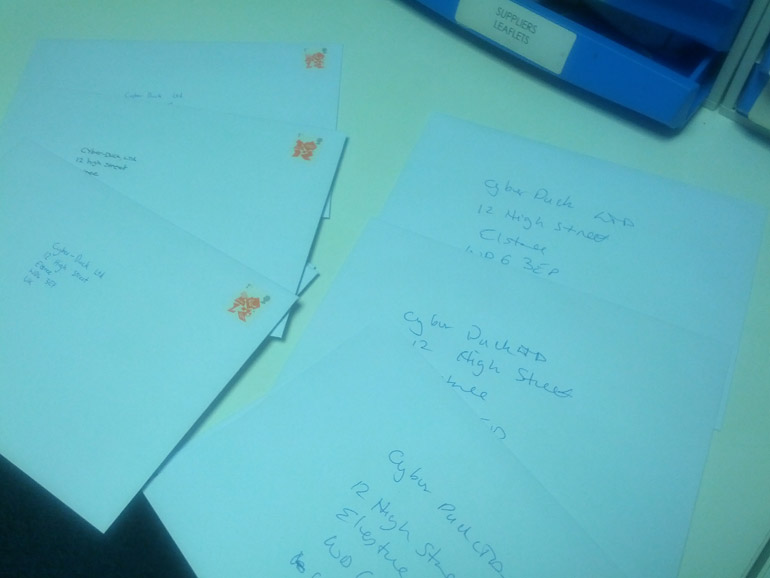This week, Danny and Mark visited the University of Hertfordshire (UH) to lecture MEng students about advanced project management using Scrum, User Centred Design (UCD) and Lean.
Cyber-Duck has always been proud of our fantastic relationships with educational institutions. The University of Hertfordshire works in partnership with Cyber-Duck via a Knowledge Transfer Partnership (KTP) scheme. As I am on the scheme myself, I was invited to come in and lecture alongside Danny Bluestone, Cyber-Duck's Managing Director, about our digital agency’s project management philosophies and how this translates into product development.
About the lecture
The students we spoke to were a mixed group studying either Computer Science or Information Technology Management for Business, all looking to gain insight into how projects are managed at Cyber-Duck. Our agency uses a mixture of management philosophies. The key methodologies we used are Scrum, User Centred Design (UCD) and lean. During the lecture we used a new product (Symble analyst CRM) as a case study where we took the students through some of our key processes from design to deployment.
Scrum as an Agile Philosophy
After introducing Symble and how we used node.js, mongoDB and HTML5 to develop it, we discussed the challenges of adapting a new product to stakeholder demands which is bound to happen during the development of a new product. This is where we used Scrum philosophy to ensure that the product backlog is flexible and can be prioritised according to product owner demands. We also discussed how Scrum brings freedom, transparency and superior communication to the team.
User Centred Design (UCD) Workshop
After explaining what UCD is and introducing a quote from James Jesse Garrett (no family connection!), we ran a workshop to get students to critique the current university learning portal to highlight the importance of designing around the user as opposed to designing based on the designers ‘own assumptions’. We introduced ‘HMW’ (how might we) techniques where we asked students ‘how might we' improve the current user interfaces based on their own experiences as real users. After probing the students and encouraging debate, some lively ideas sprung up including merging the user interfaces together (to reduce clutter), inserting a scheduling app interface (to make it easier to see the studying timetable). Another student proposed that the web portal should be mobile friendly.

We proved the effectiveness of lean project management using a simple test.
Lean Experiment
After explaining the benefits of UCD and designing for the user, we moved over to lean efficiency and the benefits of validated learning. During the lecture Danny and I carried out an experiment with the students, the aim of this was to show that using a lean methodology produces greater results. The task was simple: to place an A4 sheet into an envelope, sealing it, writing the address and fixing a stamp; this had to be done 6 times. There were two teams; Team A consisted of four students; Team B was just one student. After 2:30 minutes Team A had completed the task, by this point Team B only needed to add the stamps to their envelopes making the result fairly close even with the resource advantage given to Team A. It was clear that Team A wasted a large amount of the time discussing amongst themselves how best to complete the task, whereas Team B was able to start almost immediately.
Why Lean is Efficient
The result of our experiment was as we expected, an individual working alone is almost as efficient as a group on a simple task. Aside from the time taken to complete the task we could also see the consistency from Team B was much higher (albeit with slightly scruffier handwriting). This was only a simple task, consider the result if the teams were asked to do the same task, but for 20 letters with different envelopes, postage classes and available pens, each of these having an associated cost. As more decision was added into the tasks Team A would have more to come to a consensus on, in contrast Team B would only have to make a decision and start work. This highlights the lean principle of reducing waste and why the use of four people to complete a task is excessive, when one person can do it just as fast and as well.
Feedback from the University of Hertfordshire
We really enjoyed the lecture and speaking to the students. Following the talk Austen Rainer, Principal Lecturer at University of Hertfordshire said: “Danny and Mark gave a compelling lecture on how Cyber-Duck use scrum, lean and user centred design in their work with clients and partners. They also touched on system integration issues, the importance of accreditation and SLAs, and of professionalism. The students enjoyed the talk and the interaction. The talk complemented the range of topics that the students are learning in the module.”
Working closely with universities and educational institutions is really important to us at Cyber-Duck. For example read about how we mentor students visit our CSR page.
